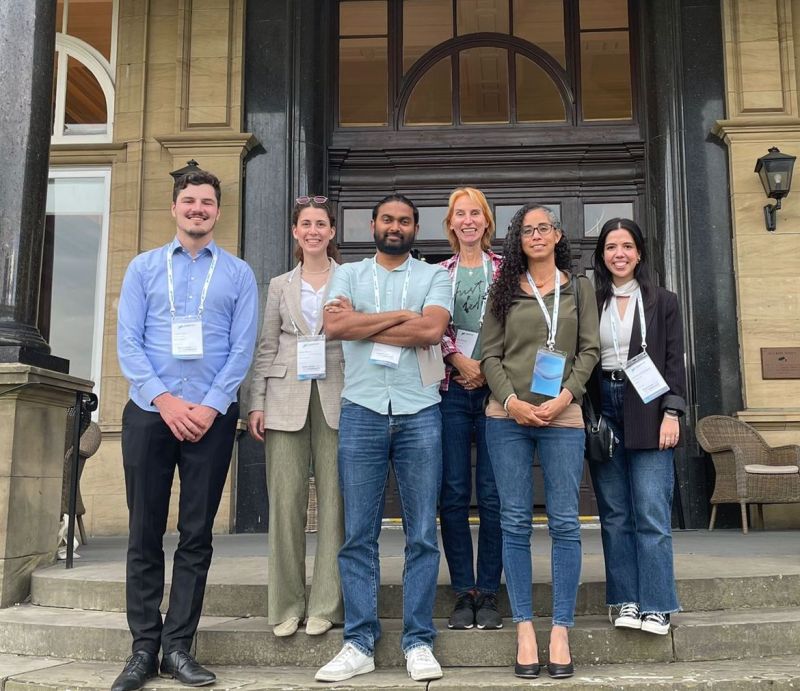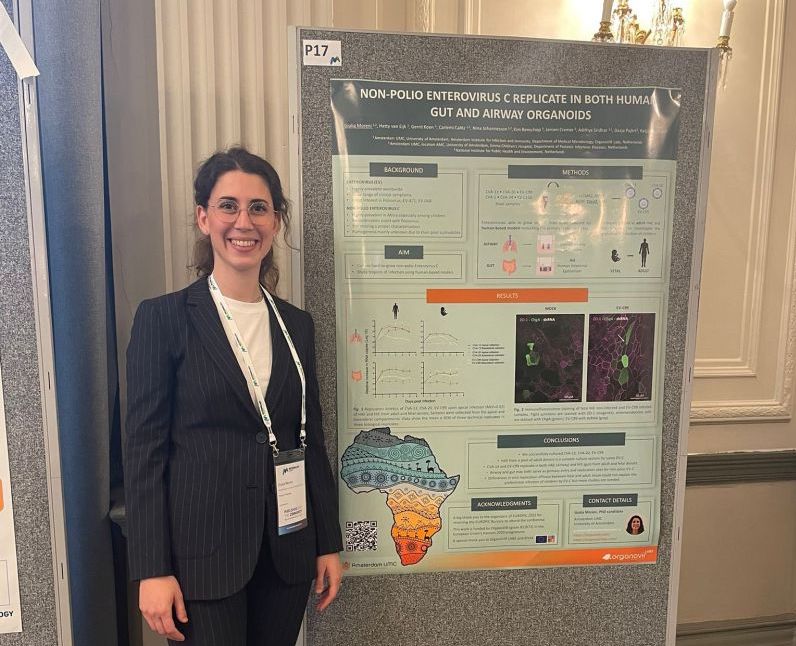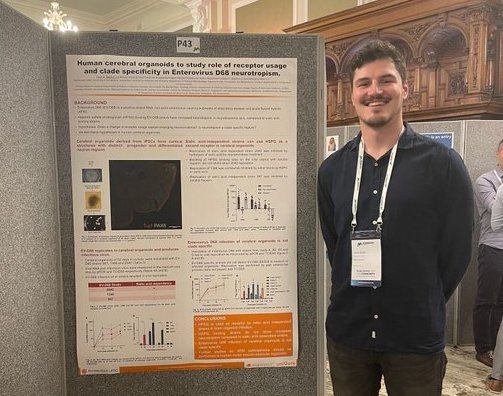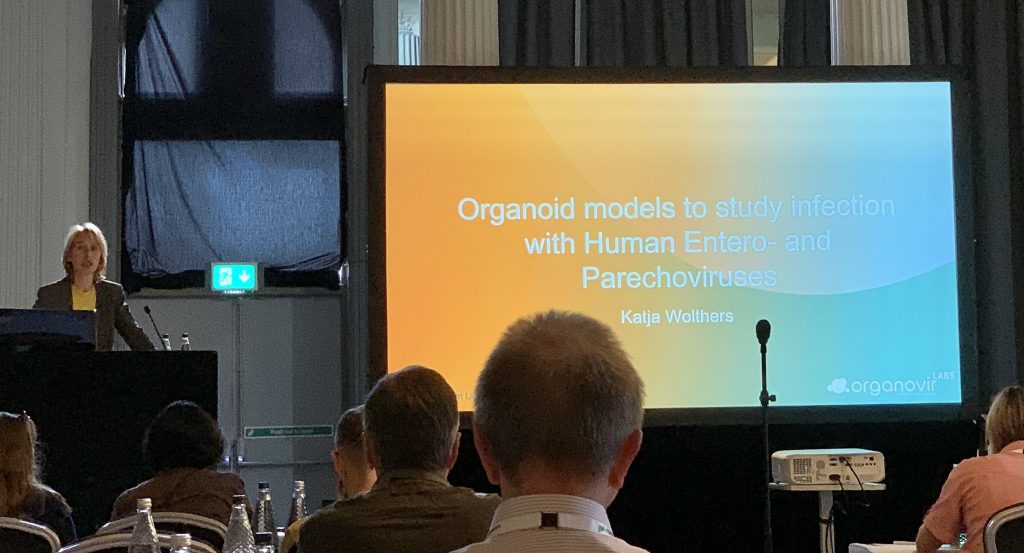
29 Jun OrganoVIR Was at Europic 2022!
(pictured from left to right: Josse Depla, Giulia Moreni, Adithya Sridhar, Katja Wolthers, Kimberly Benschop, and Inés García-Rodríguez)
Earlier this month, four members of the OrganoVIR consortium, Katja Wolthers, Kimberly Benschop, Inés García-Rodríguez, and Giulia Moreni journeyed from Amsterdam, the Netherlands to the United Kingdom for a conference. Joining them were two researchers from the OrganoVIR Labs, Adithya Sridhar and Josse Depla. Many hours, several cancelled flights, and other turbulances later, they arrived at Harrogate – just in time to attend Europic 2022.
Europic 2022, held between the 5th to the 9th of June this year, is an international virology conference that focuses on studies of picornaviruses, a family of human and animal pathogens which includes enteroviruses, hepatitis A virus, and foot-and-mouth disease virus. The program of the conference included plenary talks from experts, offered papers, and poster sessions. We are thrilled to share that this year, our members were able to represent our consortium through different roles during the conference.
Our Early Stage Researcher (ESR), Inés García-Rodríguez was the first to represent OrganoVIR at Europic 2022. On Monday the 6th of June, Inés delivered an oral presentation (titled ‘Human-based models to study genotype dependent infection of parechovirus A’) in which she described how intestinal organoids and enteroids, 3D models that closely mimic intestinal cellular heterogeneity and organization, are able to facilitate viral studies. In her presentation, she elaborates how she investigated the viral dynamics and tropism of PeV-A1 and PeV-A3 using human-based models of the intestine (enteroids) and the brain (cerebral organoids). “I was a great experience! I was able to talk to some of the authors of my favourite papers and it was really inspiring to see new developments in the field of virology” she said about the conference when we interviewed her.

Inés García-Rodríguez during her presentation at Europic 2022
During the poster session on the 6th of June, another one of our ESR shined bright. Giulia Moreni stood proudly beside her poster (titled ‘Non-polio enterovirus C replicate in both human gut and airway organoids’) as attendees of the conference surrounded her poster. “I’m very happy with my poster! It received many positive feedback and several visitors helped to give some ideas for my research” she gushed. Her poster discusses the global prevalence of Enteroviruses (EVs), which causes a wide range of diseases in children and adults, but most importantly, that enteroviruses (in particular CVA-13, CVA-20, and EV-C99) replicate in both airway and HIE gut from adult and fetal donors.

Giulia Moreni and her poster at Europic 2022
On that day, our researchers were joined by a PhD student from the OrganoVIR Labs, Josse Depla. At the conference, Josse presented his poster ‘Human cerebral organoids to study neurotropism of different enterovirus D68 clades’. His poster focuses on a positive strand RNA, Enterovirus D68 (EV-D68) and how it has caused several outbreaks of respiratory disease in the last decade. In his poster, Josse described how EV-D68 replicates in cerebral organoids (see p. 44 of the posters abstract). In addition to presenting his poster, Josse was also informed that he was able to do an oral presentation about his research. “I was initially nervous because in-person presentations are different compared to the presentations I did virtually during the pandemic” he shared, “But once I got going I wasn’t nervous anymore”.

Josse Depla and his poster at Europic 2022
Two days later, on Wednesday the 8th of June, our coordinator, Katja Wolthers kicked off the afternoon session of the conference with a keynote presentation. During this session, Katja delivered a presentation about using models to study infection with human enteroviruses and parechoviruses. Through her presentation, Katja was able to provide attendees of the conference with an overview of how OrganoVIR started in the field of parechoviruses, how we worked with organoids, and how we applied organoid technology for virology. “After my presentation, I received a lot of questions about the techniques and invites for collaborations on organoids. I think we reached the goal of our presence there: to show people that organoids are awesome!” she said.

Katja Wolthers during her keynote presentation at Europic 2022
Aside from oral presentations and a poster presentation, OrganoVIR was also represented in other roles within the conference. Kimberly Benschop, our partner from the Dutch National Institute for Public Health and the Environment (RIVM), was selected as a member of the scientific advisory board and poster jury. Additionally, she also delivered an oral presentation on her paper ‘Re-emergence of enterovirus D68 in Europe after easing the COVID-19 lockdown in 2021’. This was not Kimberly’s first time attending Europic, as she has annually attended the conference since 2008. “It’s always wonderful to attend Europic” she said, “It was great to see everyone again and I loved seeing the progress in this field”.
Despite the hurdles (rain, delayed flights, and late-night drives) that happened prior to the conference, we are incredibly glad that our researchers were able to deliver their presentations and that they enjoyed their time in Europic 2022. Two weeks after Europic 2022, several of our researchers, Katja, Inés, and Giulia attended the ‘Keystone Positive-Strand RNA Viruses’ conference in the United States in which they also presented their research in the field of organoids. Currently, they are gearing up for another exciting and upcoming conference, the 41st Annual Meeting of the American Society for Virology (ASV 2022), which will take place between the 16th to 20th of July 2022, at the University of Wisconsin-Madison, Wisconsin, the United States.
To stay up to date with our researchers, make sure to follow us on LinkedIn and Twitter.
